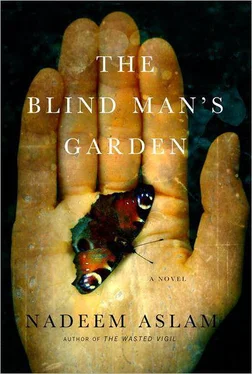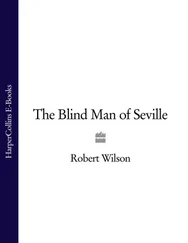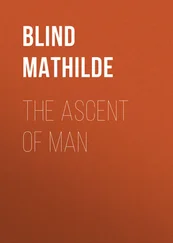*
She breathes the dawn air, thinking of the moment he will return pale with road dust and with her necklace at his throat. Damaged and scarred, he is still perfect and she sees why the gods might wish to use human beings as instruments.
For all the boots of the tramping warriors
and all the garments rolled in blood
shall be burned as fuel for the fire.
Isaiah

Year by year the irises enlarge their colonies. Three erect petals with three sepals — each blossom on its hollow stem is slate blue with veins of a darker shade, and a cavity of silk at the centre. Naheed stands beside them and turns her head to see the two children playing with the toy truck. Mikal’s son and that of Basie and Yasmin. They run along the paths with it, their shouts filling the clear rain-cooled air.
She enters the kitchen and begins to make chapattis, shaping them carefully so that it is pleasure as well as work. Mikal had pointed out that she rolls the ball of dough in the palm of her hand anticlockwise. Like Tara and Yasmin. He had no memory of how his own mother did it.
These years later, his child is out there on the red path with his cousin.
She counts the chapattis, knowing how many each person will eat. Yasmin teaches at the Aligarh Secondary and High School and will return home soon and they will sit down to eat together. Father Mede has never been heard from since the siege but his school is slowly being rebuilt. By the time it is ready Naheed herself will have qualified as a teacher. She knows about Galileo singing to mark time as he measured the pull of gravity, and Newton carefully inserting a needle behind his own eye to learn how light causes vibrations in the retina, and Syed Ahmed Khan saying, ‘There is no difference between the word of Allah and the work of Allah.’
She imagines what the boys will be like as young men — reserved in manner on the whole, but with a component of laughing wildness in the personality, revealing itself occasionally.
Within the garden she has tied a cord from place to place. They refer to it as the ‘rope walk’ and it connects all the different plants and locations Rohan likes to visit. Rohan makes his way through the garden by holding onto it, feeling his way along the red line zigzagging through the trees. Sometimes the children suggest that it should continue outside the house too, a thread connecting the house to the mosque, the bazaars, the houses of acquaintances. The rope walk takes in Sofia’s study. And it leads from Baghdad House to Mecca House, from Cairo House to Cordoba House and Ottoman House, and finally to Delhi House, the banyan above it and the laden warm sway of mangoes on two-foot-long stalks.
Ardent Spirit is still there on the other side of the river, though Kyra has disappeared and is wanted by the government, according to the newspapers. Some say he is in Iraq or Waziristan. Ardent Spirit is now run by the government and for the time being Rohan and his family are allowed to remain at the house, their status and life precarious, but no worse or better than most in this heartbroken and sorrowful land.
Naheed watches the boys, Tara chewing fennel seeds for a minute to soften them and then passing them from her mouth into theirs. Tara, who had moved in here when the family prevented Sharif Sharif from marrying Naheed, and he asked Tara to leave her home. They are outside Ottoman House. Each yellow tulip that grows outside it has a dark brown pupil at the base of the cup, and to look into it is to feel that the flower is returning the gift of attention — strengthening one’s existence that way. The parentage of Mikal and Naheed’s son is a secret from the neighbourhood. Halfway through the pregnancies Naheed and Yasmin went away to a distant village and returned after the births, with the claim that Yasmin had had twins. It’s a lie no one would rather tell but there is no alternative, and again they remind themselves that they are more fortunate than many in this country.
And so she watches the boys, engaged in their games and small conspiracies out there, the years slowly passing as she waits for Mikal who is by now more a feeling than a person, a sensation in the breast and a penumbra of associations created by separation, the days lengthening and shortening and the arrival and disappearance of seasonal fruits and vegetables in this kitchen. At night sometimes she sees him when the lightning reveals the faces of prophets and kings suspended in the bark of the surrounding trees. He had told her that the brightest planet in the sky was Jupiter and storms had raged on its surface for hundreds of years .
She had waited for him once before, and that time too everyone said he was no longer alive.
*
In the glasshouse Rohan touches the germinating seeds with his fingertips and recites a verse from the Koran. It is God who splits the seed and the fruit stone. He brings forth the living from the dead and the dead from the living …
*
She looks up from the page she has been reading just as the gate opens to admit Mikal. Perhaps it is his ghost, here to convince her to continue with her life without him. He raises his hand slowly and she stands up and walks towards him, her own hand held out. The insects weave a gauze of sound in the air. She moves towards him and her eyes are full of a still intensity — as though aware of the unnamed, unseen forces in the world, and attempting in her mind to name and see them.
This is a work of fiction. The characters, events and organisations depicted in it are either the author’s creation or are used fictitiously. No resemblance is intended to any persons living or dead, to any organisations and events past or present.
My first debt is to Candia McWilliam, from whose perfect novel Debatable Land I have taken the words ‘Ardent Spirit’. The italicised lines in chapter 3 (see here) are from The Temptation to Exist by E. M. Cioran (The University of Chicago Press, 1968). The italicised passage in chapter 15 (see here) is from Salman Rushdie’s The Moor’s Last Sigh (Jonathan Cape, 1996). The letter quoted in chapter 17 (see here) is by Walt Whitman, from Walt Whitman’s Civil War, edited by Walter Lowenfels (Da Capo Press, 1960). The line that ends the first section in chapter 31 (see here) is the reverse of one to be found in Mitti ki Kaan by Afzal Ahmed Syed (Aaj Publications, Karachi, 2009). The original reads, ‘Love is not a distinguishing mark, something by which a dead body can be identified.’ (My italics.) The italicised words that end chapter 35 (see here) are by Simone Weil. The lines Mikal remembers in chapter 36 (see here) are by W. B. Yeats. A book I found helpful was The Interrogator’s War by Chris Mackey with Greg Miller (John Murray, 2004). Another was Beslan by Timothy Philips (Granta Books, 2008). An early study for chapter 16 appeared in Granta 116: Ten Years Later. I am grateful to John Freeman and Ellah Allfrey for their advice and kindness.
Thank you Salman Rashid, as always. Lewis Burns. Mrs Shamim Akram. Andrew Wylie, Sarah Chalfant and Charles Buchan. Stephen Page, Lee Brackstone and Angus Cargill in London, and Diana Coglianese and Sonny Mehta in New York.
Nadeem Aslam is the author of three previous novels, Season of the Rainbirds (1993) , Maps for Lost Lovers (2004) — longlisted for the Booker Prize, shortlisted for the IMPAC Prize, and awarded the Kiriyama Prize and the Encore Award — and, most recently, The Wasted Vigil, described by A. S. Byatt as ‘unforgettable … tragic and beautifully written’. Born in Pakistan, he now lives in England and is a Fellow of the Royal Society of Literature.













